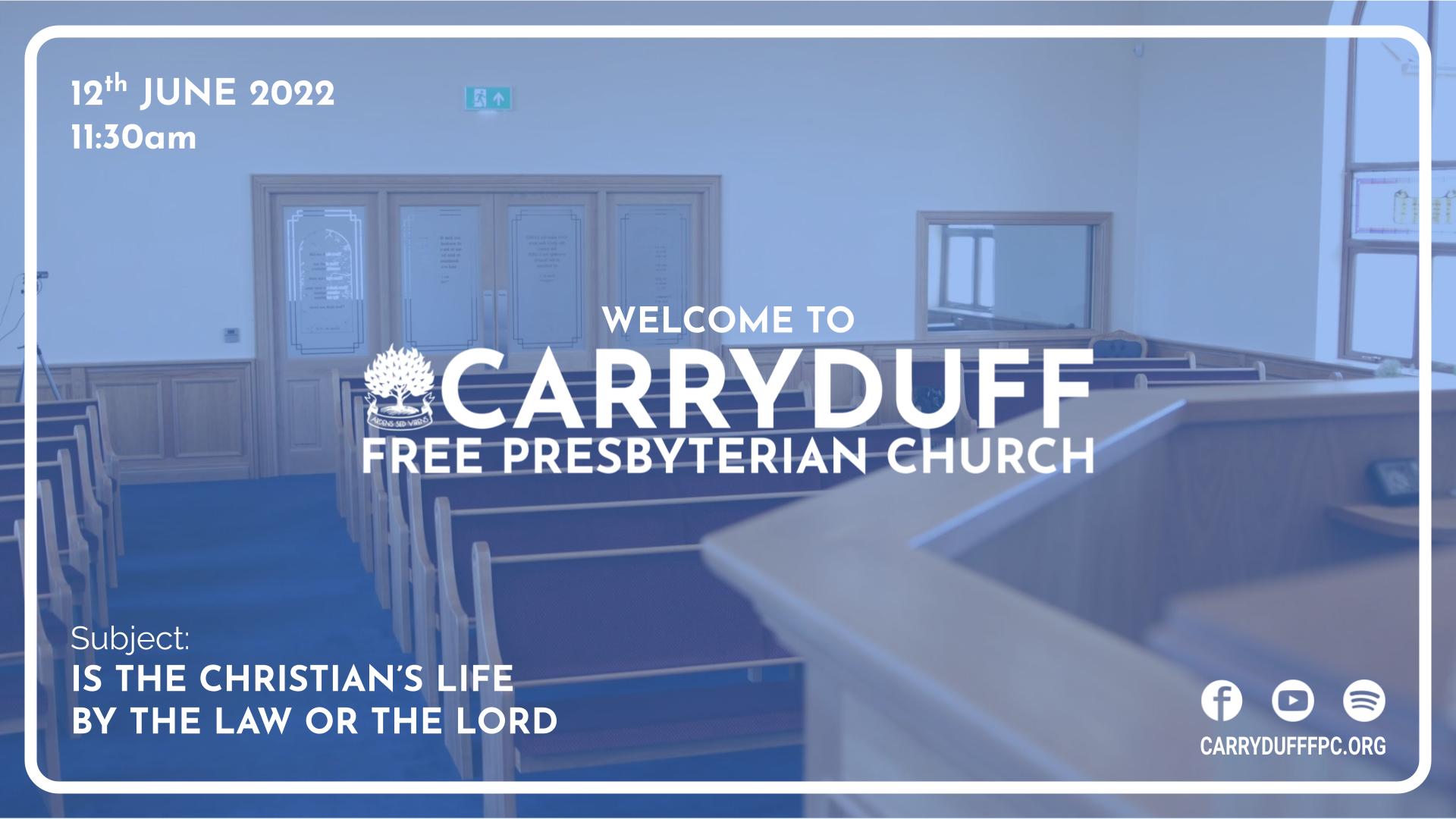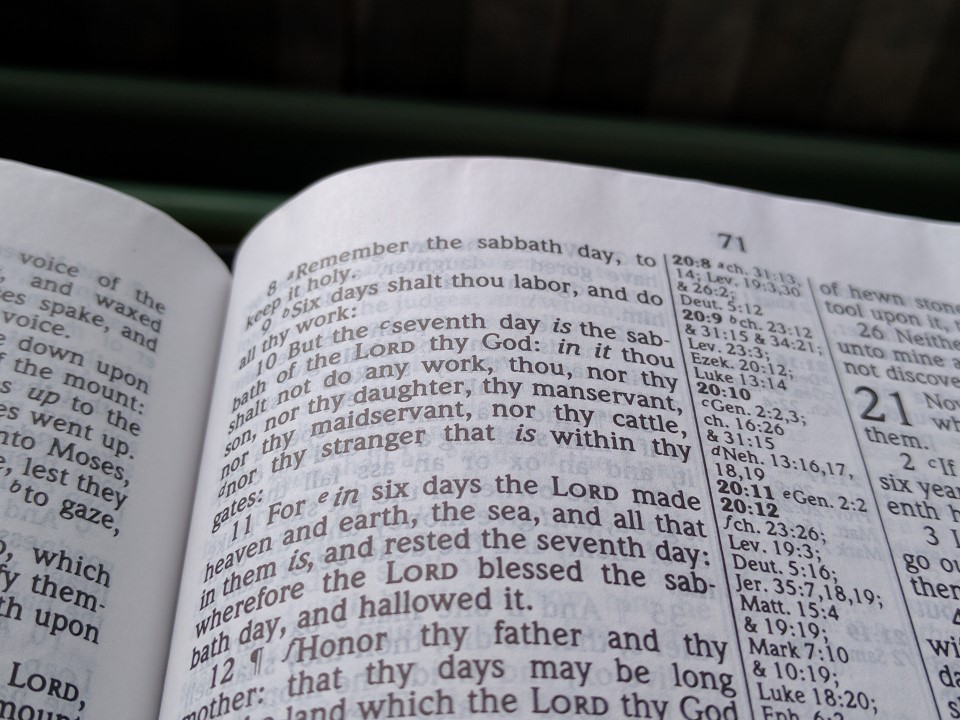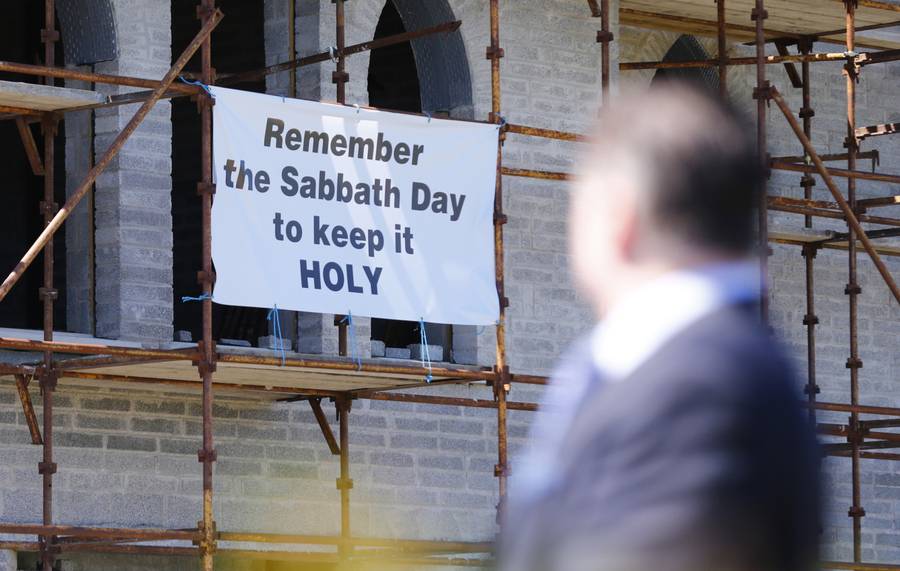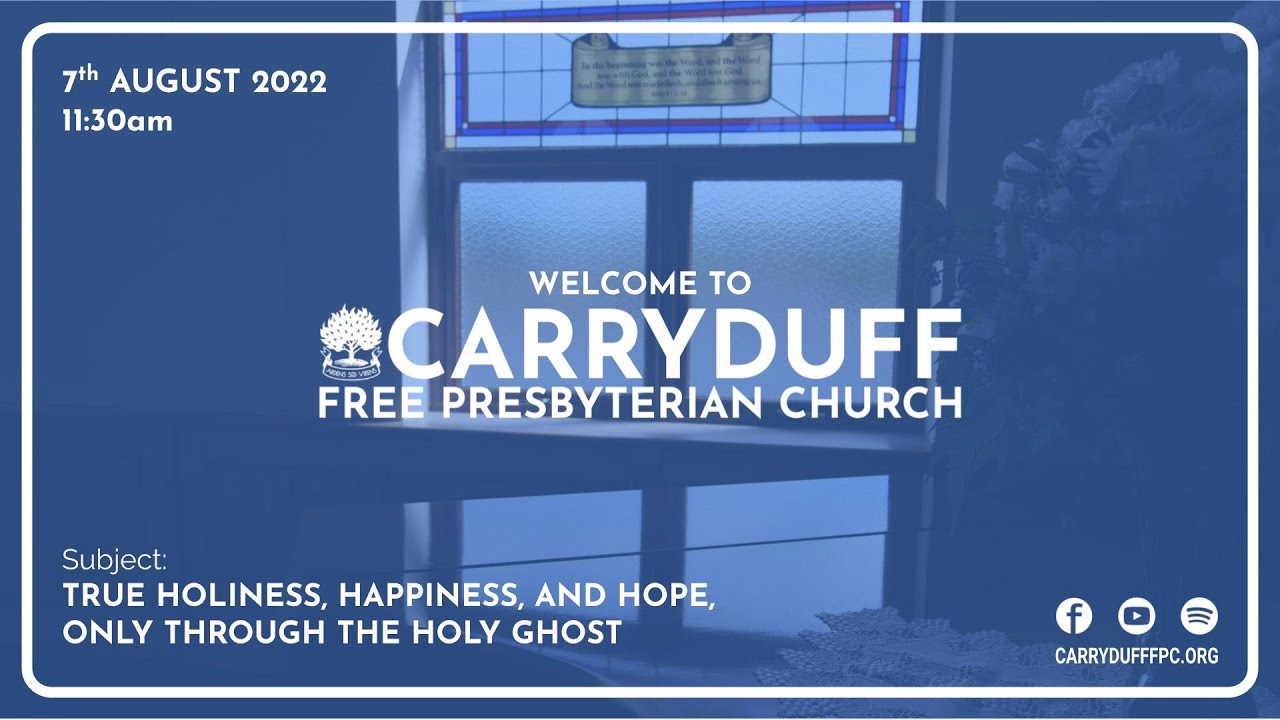Date: Sun 11:30AM 26th June 2022
Preacher: Rev. David McLaughlin
Bible Reference: Colossians 2:16-17
Let no man therefore judge you in meat, or in drink, or in respect of an holyday, or of the new moon, or of the sabbath days: Which are a shadow of things to come; but the body is of Christ.
Sermon Summary: Should Christians Keep the Sabbath Day Holy?
This sermon addresses the fundamental question: Should Christians today keep the Sabbath day holy unto the Lord, as mandated by the Fourth Commandment (Exodus 20:8-11)? The preacher uses Colossians 2:16-17 as a springboard to explore this issue, emphasizing its importance and relevance for modern Christians. The sermon is structured around three main points: (1) the denial of the weekly Sabbath, (2) the defense of the weekly Sabbath, and (3) the delight in the weekly Sabbath. The preacher argues that the Fourth Commandment remains binding for Christians, refuting arguments to the contrary and grounding the obligation in Scripture, theology, and the practice of the early church.
Introduction
The sermon begins by framing the question as both basic and fundamental: Are Christians obligated to keep the Fourth Commandment, which commands believers to “remember the Sabbath day, to keep it holy” (Exodus 20:8)? The preacher stresses that this is not a trivial matter but one with profound implications for the church’s witness and society. He laments that many professing Christians, including evangelical pastors, elders, and deacons, dismiss the Sabbath as non-binding, labeling its observance as legalistic or outdated. This dismissal, he argues, is not only a rejection of biblical teaching but also a sinful trend that weakens the church and fuels secularization. The preacher notes that Sabbath desecration, akin to the days of Moses, Jeremiah, and Nehemiah, is rampant and damaging to both the church and society.
1. The Denial of the Weekly Sabbath
The preacher outlines seven common arguments used by some Christians to deny the obligation to keep the Sabbath:
- The Fourth Commandment is a Jewish law: Critics claim it was a cultural sign for the Jews, not applicable to New Testament Christians.
- The Fourth Commandment is absent in the New Testament: Unlike other commandments, it is allegedly not referenced or reaffirmed.
- The Sabbath is ceremonial, not moral: Nine of the Ten Commandments are considered moral and enduring, but the Sabbath is deemed ceremonial, fulfilled and abolished by Christ’s coming.
- Christians are under grace, not law: The New Testament emphasis on grace (Romans 6:14) is interpreted to mean freedom from Sabbath observance.
- Paul’s teachings in Romans 14:5-6 and Colossians 2:16: These passages are cited as evidence that Christians are free to regard all days alike or not judge others regarding Sabbath observance. The preacher highlights a textual issue in Colossians 2:16, noting that the Authorized Version uses “Sabbath days” (plural), while modern translations like the NIV use “a Sabbath day” (singular), potentially misrepresenting the text as referring to the weekly Sabbath.
- The Sabbath as a type of rest in Christ: Some argue it was a ceremonial foreshadowing of spiritual rest in Christ, no longer necessary after His fulfillment.
- Mosaic ceremonial laws are obsolete: All liturgical, ritual, and ceremonial aspects of the Mosaic law, including the Sabbath, are seen as non-binding for New Covenant believers.
The preacher asserts that these arguments have led many to falsely conclude that Christians are under no obligation to keep the Sabbath. He traces the rise of this teaching to around the 1920s, distinguishing it from the Seventh-day Adventist emphasis on the Sabbath, which he also critiques as misguided since salvation comes through Christ, not law-keeping (Acts 4:12, 16:30-31).
2. The Defense of the Weekly Sabbath
The preacher counters the seven objections with a robust biblical defense, arguing that the Fourth Commandment remains binding for Christians. Key points include:
- The Fourth Commandment’s Permanence: The preacher affirms that the entire moral law, including the Fourth Commandment, reflects God’s holy character and is universally binding (Exodus 20:8-11). He challenges those who dismiss the Sabbath to explain why they uphold other commandments (e.g., against murder or adultery) but reject this one.
- New Testament References to the Sabbath:
- Romans 14:5-6: The preacher argues this passage does not mention the weekly Sabbath but addresses disputes over Jewish holy days and festivals, particularly among weaker and stronger brothers. To interpret it as abolishing the Sabbath is to read into the text.
- Colossians 2:16: The phrase “Sabbath days” (plural) refers to additional Jewish ceremonial Sabbaths (e.g., tied to the seven-year cycle or Jubilee), not the weekly Sabbath. These ceremonial Sabbaths are no longer binding, but the weekly Sabbath endures.
- 1 Timothy 1:8-9: Paul’s reference to the law being for the “unholy and profane” alludes to Sabbath-breaking, as “profane” is used in Nehemiah 13:17 to describe Sabbath desecration. The passage also references violations of other commandments (e.g., murder, lying), implying the entire moral law, including the Fourth Commandment, is in view.
- Hebrews 4:9-10: The Greek word sabbatismos (“a keeping of the Sabbath”) indicates that a Sabbath rest remains for God’s people, reinforcing the weekly Sabbath’s continuity.
- The Sabbath as a Creation Ordinance: The preacher traces the Sabbath to Genesis 2:2-3, where God rested on the seventh day, blessed it, and sanctified it. This establishes the Sabbath as a divine pattern for humanity, not a Mosaic innovation. The seven-day week is a God-ordained rhythm, evidenced by the failure of secular attempts (e.g., the French 10-day week) to replace it.
- Christ’s Fulfillment of the Law: While Christ fulfilled the law (Matthew 5:17), He did not abolish it. The Sabbath, like other commandments, remains a rule of life for Christians, not a means of salvation. The preacher clarifies that being “not under law but under grace” (Romans 6:14) means freedom from the law’s condemnation, not its commands. Jesus Himself affirmed the law’s enduring role (John 14:15: “If you love Me, keep My commandments”).
- The Sabbath’s Change to the Lord’s Day: The preacher explains that the Sabbath shifted from the seventh day to the first day of the week (Sunday) in the New Testament, based on:
- Christ’s Resurrection: Jesus rose on the first day (Matthew 28:1).
- Pentecost: The Spirit descended on the first day (Acts 2).
- Apostolic Practice: Paul preached and the Corinthians collected offerings on the first day (Acts 20:7; 1 Corinthians 16:1-2).
- John’s Vision: John was “in the Spirit on the Lord’s Day” (Revelation 1:10), referring to Sunday. This shift reflects the Sabbath’s transformation into a memorial of Christ’s resurrection, not its abolition.
- Historical Christian Practice: The preacher cites theologians like Jonathan Edwards, B.B. Warfield, and Thomas Watson, who upheld the Sabbath’s permanence, reinforcing the church’s historical commitment to its observance.
- The Sabbath’s Purpose: Beyond rest, the Sabbath is a day for worship, reflection on creation and redemption, and spiritual renewal. It regulates the rhythm of life, balancing work and rest, and serves as a sign of God’s covenant with His people (Exodus 31:13).
3. The Delight in the Weekly Sabbath
The preacher concludes by urging believers to delight in the Sabbath, drawing from Isaiah 58:13-14, which calls the Sabbath a “delight” and “honorable.” He emphasizes:
- Purpose: The Sabbath is holy, set apart for God, to prevent lawlessness and godlessness (Nehemiah 13:17; Jeremiah 17:26).
- Priority: It is God’s day, dedicated to worship and spiritual growth, not personal pleasure or secular activities.
- Sign: The Lord’s Day is a sign of belonging to God, a public witness to the world (Exodus 31:13). Neglecting it weakens the church’s testimony.
The preacher shares a personal anecdote about Dr. Lindsey Wilson, who as a young person resented church but came to love the Sabbath after conversion, illustrating that true delight in the Sabbath flows from a heart transformed by God. The Sabbath is not a burden but a blessing, designed for physical rest and spiritual health.
Conclusion
The preacher reaffirms that Christians are obligated to keep the Sabbath day holy, refuting arguments that it is obsolete or non-binding. He grounds this obligation in Scripture (Old and New Testaments), the creation ordinance, Christ’s fulfillment of the law, and the apostolic practice of observing the Lord’s Day. The sermon challenges believers to honor the Sabbath as a holy day, not a holiday, and to delight in it as a sign of their covenant relationship with God. Neglecting the Sabbath, he warns, dishonors God and harms the church’s witness, while embracing it fosters spiritual vitality and obedience to God’s Word.
The sermon ends with a call to reflection: Do we delight in the Sabbath, or do we profane it? The preacher prays that God would bless this teaching and restore a love for the Lord’s Day among His people.
Key Takeaways:
- The Fourth Commandment is part of God’s moral law, universally binding and not merely ceremonial.
- The New Testament does not abolish the weekly Sabbath but transforms it into the Lord’s Day (Sunday), commemorating Christ’s resurrection.
- Common objections to Sabbath observance misinterpret passages like Romans 14:5-6 and Colossians 2:16, which address ceremonial days, not the weekly Sabbath.
- The Sabbath is a creation ordinance, a divine rhythm for work and rest, and a sign of God’s covenant.
- Christians should delight in the Sabbath as a day for worship, rest, and spiritual renewal, not secular pursuits.
This sermon is a passionate defense of Sabbath observance, rooted in Scripture and aimed at correcting a dangerous trend in modern evangelicalism.
Subscribe to the podcast here:
Spotify Podcasts | Apple Podcasts | Pocket Casts
Email | RSS | more information here








